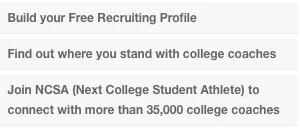2013 NCAA Convention: Initial Eligibility Educational Session
The session on educational initiatives surrounding the new initial eligibility standards was not a chance to rehash the legislation, but instead focused more exclusively on getting the word out to high schools and prospects about the new changes. All of the panel talked about the urgency and, in the words of John Morris, deputy AD at Colorado State, “moral obligation” to make sure prospects are informed about these changes. The general sense of the panel, and it seemed the room as well, was that no matter what schools all felt behind in some way, no matter what they had done so far.
The other theme was selling benefits to the changes, rather than just hammering coaches, high school counselors, and prospects with the need to meet the new requirements. Better prepared prospects should graduate at a higher rate and require less time and energy to guide them through the process. Eric Hart, associate AD for academic services at Delaware State, talked about using the academic redshirt year as a springboard to a masters degree, by helping athletes get up to speed and graduate sooner.
There were a few other unique educational initiatives like how the Division I universities in Kansas collaborated on a single set of educational materials, so schools in the state were getting a consistent message. Colorado State head football coach Jim McElwain has made a commitment to not just have his staff visit every high school in the state, but be sure to stop in to every counseling office to provide materials and instill a sense of urgency. Adrienne Ridgeway, assistant AD for academic services at Marquette, talked about how you can use website analytics to place information where it will be most widely read.
It is not going to calm many fears about the legislation itself being unfair, but the educational efforts seem to be kicking into high gear. It will be interesting in the fall of 2016 to see whether it had an appreciable effect, by comparing how much of the expected shortfall was averted versus other times the legislation was changed. We should start to get indications as soon as fall of 2015 though, when the recruiting profiles of athletes who missed the requirement of 10 core courses prior to senior year start to change. Until then, it sounds like schools will be trying aything and everything to see what sticks.


